Duco van Oostrum: Where Do We Go From Here?
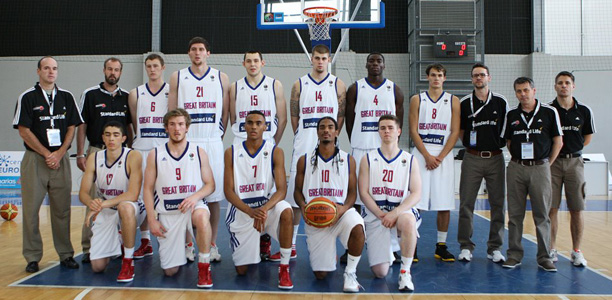
In his final blog covering the GB U20s’ Division B European Championships campaign in Sofia, Bulgaria, Duco van Oostrum asks, “where do we go from here?”
The Olympics are here. The pinnacle of GB basketball, maybe forever, or another 70 years, when London is awarded the Olympic bid again. Or maybe this is just the start, with qualification for Rio 2016 the next realistic target for all the talents pushing for their place on the world stage of elite basketball.
Those diametrically opposed scenarios are linked to the GB youth programmes, in particular the U20 and that ephemeral thing called Futures. To qualify for Rio 2016, we would realistically look at players in the age range from 23-30 then, most of them having gone through these youth programmes. Ideally, there would be an NBA superstar, some NBA role players, and players performing in the highest European competitions.
One of the predictors of future performance is the international success of those youth programmes up to now. Has GB performed at a ‘top 12 world’ level in these age groups? Oops. Not quite.
While there is individual talent on the teams spread across different generations, GB has never been able to pull it together to get promotion out of the B-division, let alone challenge for the medals in the Division A—a minimum requirement. It’s not surprising to see the Div A medal count over the years and note the familiar top nations in Eurobasket (Spain, Lithuania, France, etc). The individual top talent there are also already ‘draftable’ or drafted and already play in major Euro competitions.
I’ve been to the last 4 GB U20s’ tournaments and to England youth Europeans. What constantly surprises me is that people unfamiliar with European national basketball think that GB is just stacked with talent and they should easily win these competitions.
Doesn’t GB have all these players playing on a scholarship at a US college, and isn’t the NCAA the best basketball in the world? The answer is simply that the better teams can draw on a bigger pool of players, have players already playing in a domestic pro-competition (and not just sitting on the bench) or an international one (the MVP of the U20s, Ondrej Balvin, plays for Cajasol), and have huge basketball traditions.
Yes, our teams have MBA, Dan Clark, Andrew Lawrence, Ovie Soko, Devon, Ryan Richards, but other teams have multiples of those on one team. For many of our players in US college, the big question will be, what comes after? Will I be able to secure a big pro-contract? For many of the best teams, the question for the player is, will I go to college as a ‘one-and done’ (Poland’s 7-footer Karnowski goes to Gonzaga this year), can I get a better buy-out of my pro-contract and move (Abrines for Spain), can I improve my current contract?
The teams finishing above GB U20s this year, for example, are stacked in that regard, Poland’s dream generation (and they actually failed), Israel (pros in the tough Israeli league), Bulgaria (major players on top Italian teams, Ivanov, Tenchev), Czech Republic (3 super quality players, Kriz, Balvin, Mares), Croatia (not an individual highlight, but a collective machine). How many of our U20s teams and Futures of the past have secured significant pro contracts or now play in the NBA?
I think it’s time for a reality check.
Of course this doesn’t mean there isn’t talent in the UK and for as long as I can remember it’s been about unlocking this huge basketball potential in the UK, athletes, a national sporting tradition, passionate fans, and money. Just not in basketball. But the potential….? This was (and is) one of the big aims of the GB programme, unleashing this potential, and using the Olympics as the key to that release.
Quite a bit of money was eventually put into this programme and the heroics of Chris Finch’s vision for the future and the commitment of players eventually saw the team qualify for Eurobasket and secure an Olympic place.
Rightly, there’s jubilation about this massive achievement, but my big worry is that it is an end target, with most people within the GB programme leaving after the Olympics, funding cut, and players focusing on other matters than GB basketball. Who will carry the torch to Rio 2016?
One of the remarkable things about the ‘GB vision’ is that it has been a national project carried out almost exclusively by those without a British passport. It’s as if the project was outsourced to Australia, Canada, and the US, since the UK basketball world was so messed up internally and didn’t have any history of international success, so it was perhaps natural to look abroad.
But almost every single paid position? And what’s going to happen now towards 2016 when the funding probably means the foreign legion salaries cannot be paid anymore? Maybe back to that good-old UK volunteer structure that has led to anyone with basketball aspirations leaving the country as soon as possible (players and coaches)?
Finally, the U20s this year and players designated for the future GB senior programme. They finished 6th. I maintain, it is a good result and equals the best ever achieved, especially when comparing the make up of this team to previous ones. Do people remember where Dan Clark, MBA, and those players finished when playing for U20s? But 6th this year feels awful, and it was because GB were one win against Finland away from historic promotion. The entire tournament hinged on this game.
This is my personal reading of the collapse in that game. The first three games, GB had surprised everyone. Three out of three, group winners in the group of death, and they even beat Croatia by double figures (the later winner of the tournament!).
How can a team that does so well, suddenly collapse in one game? The fourth quarter had been the bread and butter of GB, but now it proved Finnish feeding time. The loss to Belarus and the two consecutive rest days killed GB—that’s my conclusion. How is that possible?
As most people reading this blog know, the GB U20s came together late, publicity was non-existent, and they had new coaches, the latest additions to the GB non-British staff. Coach Dave Smart, especially, came with a terrific CV and basketball results in Canadian college basketball. He was thrown in front of a group of 13 players, not chosen by himself.
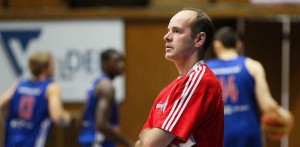
It was immediately evident that that style proved to be a severe culture shock to the players. These players commit to the national team (there are many who don’t), put their game on the line, and, instead of using the summer to rewind, go to summer school, work on individual aspects of the game, decide to represent their country.
Unfortunately, coach Smart’s illness meant he spent only a short time with the team prior to the tournament. There is absolutely no question about Coach’s basketball expertise. The team was better prepared for games because of intensive film and scouting, and with game plans than ever before.
What got to the team was the relentless breaking-down of players, with no let up. Because of the time constraints of the tournament, there was no time to build a player back up again, as there would be in a college season. I don’t want to give specific examples, but the manner of communication with players and others on the GB team was highly charged. The entire concept of the European tournament of 10 days and the traditions that go with that were not part of coaches’ experience.
The Finland game again. Devon sits out the Belarus game because of a niggle. GB lose their first game. Players receive more hair-dryer treatment, and more, and more. For 2 very long rest days, without a game to relieve the pressure of the hotel, the practice, the gym sessions. I invite analyses of performances of individual players pre- and post rest days. Some of the players had no desire to be there anymore and their game confidence was unrecognisable.
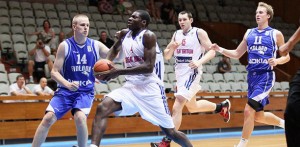
The tournament wasn’t over. I have so much admiration for this team. In one of the best games of the tournament, GB beat the Belgians in OT, behind Ali’s 37points, Devon’s double-double, Louis and Joe’s shooting heroics, Jesse’s shot-blocking, and Connor’s clutch play—but it was all the players.
Since the GB website for U20s doesn’t appear to be working over the weekend, this was a phantom game for them (no reports, interviews, etc, in spite of all having been provided immediately by the paid GB photographer—another reason why basketball perhaps suffers in the UK? Can’t get the publicity right).
It really was a great game, where the players grouped together and showed their superb team ethic . The second half of the final game v Poland was a coaching disgrace—I really mean that. Rather than letting the boys lose with dignity and have a positive end to the tournament, coach decided to go in extreme yoyo sub mode, making sure chemistry on the floor would not work, providing choice comments audible to all.
It was vindictive, without any respect, and embarrassing to watch what happened in the name of GB. Lee and Zac got 1.48min in the entire tournament at the end.
Luckily, at the final presentation, the team were able to bond together. Devon deservedly received the All-Tournament medal with the GB team giving him a loud ovation; Devon finished the tournament first in assists (6.4pgame), 4th in scoring (20.6), 1st in fouls draw (9 pg); Ali finished 3rd in scoring (20.7); Louis finished 2nd in 3-point percentage; Joe 6th. Players had really done well and stepped up, hopefully making the summer basketball for GB a positive experience.
The final bit of this report has been difficult to write and I still don’t know whether I’ve done right. The reason I’ve done it is to point out some of the dynamics of the tournament, but also this big question of ‘what next’? How do we get to Rio 2016? How does the programme function?
We can read and write all the strategy documents we want, but it’s then what happens on the ground, in the games, and in the manner of respect, where the clash between rhetoric and reality hits home.
Duco.



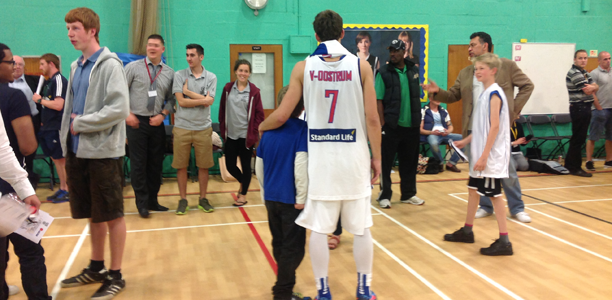
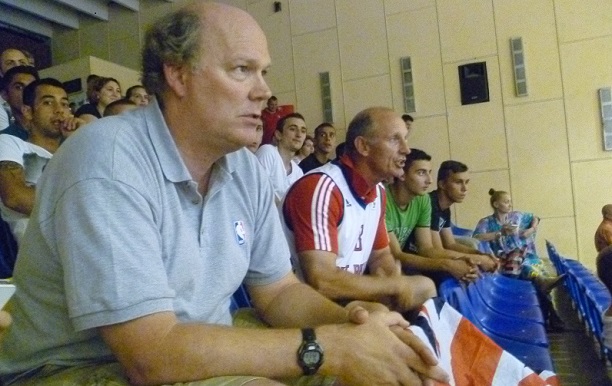
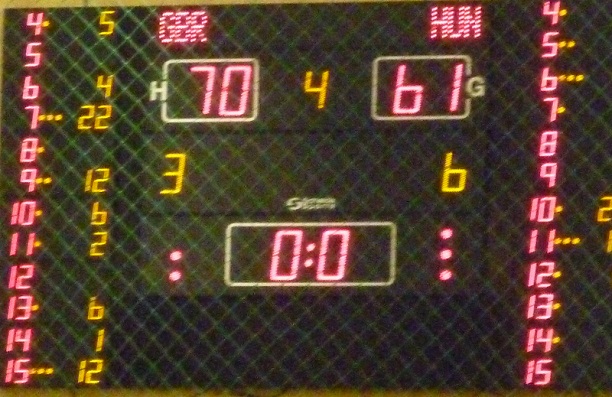

20 Comments